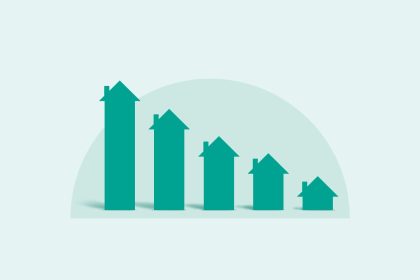Images by GettyImages; Illustration by Hunter Newton/Bankrate
Key takeaways
- The amount that makes a mortgage “jumbo” varies by location, but in most parts of the U.S., it’s a loan of more than $806,500 as of 2025.
- Jumbo loans generally have stricter borrowing criteria, such as a higher credit score, a higher level of income or assets and bigger down payments.
- The interest rates on jumbo loans are usually higher than those on regular, conforming mortgages.
A jumbo loan is a mortgage for an amount that exceeds the standard loan size, as set by the federal government. If you’re buying a mansion — or just a regular home in a highly pricey neighborhood — you’ll need an extra amount of financing to get it.
It’s not just the principal amount, though: Everything on these mortgages can be super-sized. Let’s look at what jumbo loans are and when you need one.
What is a jumbo loan?
A jumbo loan is a type of mortgage that exceeds the conforming loan limits for its area, set yearly by the Federal Housing and Finance Agency (FHFA). In most parts of the U.S. in 2025, it’s a mortgage of more than $806,500.
Many mortgage lenders offer jumbo loans up to $3 million or $5 million. You can find jumbo loans in even higher amounts, especially if you work with a mortgage broker who specializes in them.
Jumbo loans can be used for primary residences, investment properties and vacation homes.
How do jumbo loans work?
Despite their “nonconforming” status, jumbo loans aren’t much different from traditional mortgages. For example, borrowers can get fixed- or adjustable-rate jumbo mortgages with various term options.
However, the interest rates on jumbo loans often differ from conforming loans. Historically, they’ve been higher; however, the gap has closed of late. As of January 13, 2025, the 30-year fixed jumbo rate was 7.16 percent, according to Bankrate’s survey of national lenders, while it was 7.06 percent for the traditional 30-year fixed loan. This is partly because Fannie Mae and Freddie Mac increased the guarantee fees they charge to lenders on conforming loans.
Jumbo loans vs. conforming loans
Jumbo loan limits
For 2025, the conforming loan limit in most of the continental U.S. is $806,500. However, in Hawaii, Alaska and certain counties with significantly higher median home prices than the national average, the limit can be as high as $1,209,750.
Because homes that cost above these sums require a jumbo loan, these ceilings are often called “jumbo loan limits” — though technically, they’re the starting points for jumbos.
Loan limits by state
The table below provides state-by-state conforming loan limits for 2025. In many states, the limits vary by county.
How to qualify for a jumbo loan
Jumbo lenders typically impose stricter underwriting guidelines than conforming mortgage lenders do. Because the loans aren’t backed by Fannie or Freddie, jumbo mortgages pose more risk to the lender. Overall, if you want to take out one of these hefty loans, you will need to make sure your financial profile is very good or excellent.
There are three common hurdles borrowers must clear to get approved for a jumbo loan:
- Income: Your debts usually need to be less than one third of your income.
- Credit score: The minimum credit score most likely to qualify for a jumbo loan is 700.
- Cash reserves: You must make a down payment of 10 percent to 20 percent for a jumbo loan.
Jumbo loan income requirements
Yes, it’ll help if you have a large income — and, just as importantly, if you have a low-debt-to-income (DTI) ratio, the percentage of your monthly income that goes to debt payments. If your outgo is a significant part of your incoming — say, more than one-third — you might not qualify for a jumbo loan unless your credit score is excellent or you have a sizable amount of reserves or liquid assets.
Jumbo loan credit score
You’ll need a higher credit score to qualify for a jumbo versus a conforming loan. For example, U.S. Bank requires a minimum 740 credit score to be considered for most jumbo loans versus 620 for a conforming loan.
Keep in mind: Most jumbo loans are conventional loans (offered by private lenders as opposed to a government agency). One exception is the VA jumbo loan. Active military or veterans can qualify with a significantly lower credit score, sometimes in the mid-to-low 600s.
Jumbo loan down payment
You may have to make a significant down payment to qualify for the jumbo loan — typically 10 percent to 20 percent. Be prepared to show enough reserves, or liquid assets, to cover between six and 12 months’ mortgage payments.
Is a jumbo loan right for me?
Jumbos are meant for buyers with a substantial stable income and ample resources. You’ll need strong credit, a low debt-to-income ratio and at least six months of cash reserves to qualify. And if you live in a more expensive part of the country — or want and can afford to buy luxury property — a jumbo loan is essential.
That said, a jumbo loan is not for you if it means you must stretch your finances to the brink to get one. Or if it means you’ll end up being house broke or house poor, meaning your homeownership costs squeeze out everything else in your budget. And even if you have the means, know that jumbos tend to be costlier than conforming loans.
If you can’t qualify for a jumbo loan — or don’t want one — you might consider a piggy-back loan arrangement, in which you take out two smaller mortgages, both conforming, instead.
FAQ
Read the full article here





